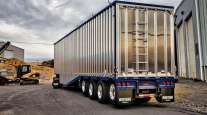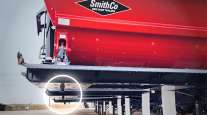May Orders for New Trailers Rise 30%
This story appears in the July 4 print edition of Transport Topics.
Orders for new trailers in May increased 30% from a year ago but slipped from an April peak, although manufacturers said the market remained strong, with total orders through May 77% ahead of 2010 and with a growing backlog of deliveries.
ACT Research, Columbus, Ind., said truckers ordered 17,700 new trailers in May, up from 13,600 in May 2010 but down 9.7% from 19,600 in April.
Through the first five months of 2011, trailer producers received 105,700 orders, compared with 59,600 in the same period last year, ACT said June 28. ACT said the backlog increased slightly to 102,500 units at the end of May.
“I think that it’s positive that backlogs in the industry are still pretty strong, already into the first quarter of next year in some cases,” Chris Hammond, vice president of dealer sales for Great Dane Trailers in Savannah, Ga., told Transport Topics. “That means that any additional orders placed this year will only make for an even stronger year. This expected slowdown in May is not frightening anybody.”
“The orders have shown a consistent, dramatic improvement year-over-year . . . with the orders coming from across the board, from fleets of all sizes,” David Giesen, vice president of sales and marketing at dry van manufacturer Stoughton Trailers LLC, Stoughton, Wis., told TT.
“Orders are coming from private fleets and the stronger truckload for-hire carriers, who seem to be growing their fleets a little, while the others are holding firm,” Craig Bennett, senior vice president sales and marketing, Utility Trailer Manufacturing Co., City of Industry, Calif., told TT.
ACT said that manufacturers built 17,500 new trailers in May, almost double the May 2010 production level of 9,350. Through May this year, trailer manufacturers have built 81,300 units, more than double the 39,900 trailers in the same 2010 period.
“In this case, the order numbers are more important than the build rate, because they show where the industry is going,” Frank Maly, ACT’s director of commercial vehicle transportation analysis and research, told TT. “The order numbers, even though they’re down as expected from April, give a clear sign that the recovery is continuing.”
Maly said that the cancellation rate of orders also was very low for the industry, which he said was another sign of strength.
“We are monitoring the impact of current economic concerns, but rather than reacting to short-term uncertain economic news and pulling back, fleets are taking long-term investment decisions and ordering,” Maly said.
“The usual seasonal decline in orders was not of too much concern for us,” Stoughton’s Giesen said. “In May, we had rapidly rising fuel prices, and that might have caused a slight pause in orders, but the recent decline in prices should ease their minds.”
“Most of the orders so far have been from fleets replacing old trailers, which really bodes well for the future,” Giesen said. “Fleets haven’t been replacing their trailers at any consistent rate [during the recession] so that there is still a lot of pent-up demand out there to replace equipment.”
“Our overall backlog is holding, but new orders for the last two weeks of May and first two weeks of June were slower than the yearly rate to date,” Utility’s Bennett said. “It has picked back up now, however, and we are optimistic that the rest of the year will be strong.”
“Sales are still good in dry vans, even though it’s down from the first quarter, and we see the market booming for the rest of this year and into 2012,” Bill Tirrill, sales manager at new trailer dealer Fleetco Inc., Nashville, Tenn., told TT.
He said Fleetco was seeing an across-the-board strong demand for dry vans in its new, used, renting and leasing departments. Fleetco has a separate leasing business that operates 1,600 trailers.
“We’re positive for this year and the next because our customers who survived the recession are telling us they can raise their rates now, and if a shipper won’t pay, they don’t have any problem finding someone else because capacity is so tight,” Tirrill said.
Lisa Petersen, director of logistics and intermodal for Market Transport Ltd., Portland, Ore., which operates 325 tractors and 900 trailers, said the company has resumed buying trailers.
“We did buy 62 new trailers this year . . . after a 2½-year pause,” Petersen told TT. “For the first time, we bought dry vans with fiberglass floors instead of wood, and we’re going to do testing before we decide whether to buy any more of that kind.”
Petersen said the company wanted to return to a “more normal” replacement cycle for its trailers.
“Most of our customers are retailers, which means we make deliveries for right now,” Petersen said. “Business was crazy at the beginning of the year, but we have seen a slowdown. We’ll make the decision to buy more trailers purely over how freight is going later on in the third and fourth quarters.”




